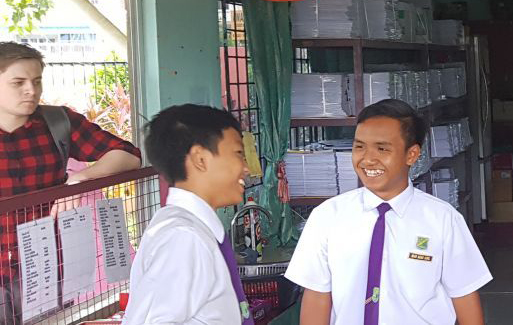When it comes to teaching entrepreneurship, practical experience can be a substantial advantage. As a 2015 paper by OECD pointed out, infusing entrepreneurship into education has many benefits, including “economic growth, job creation and increased societal resilience”, and “individual growth, increased school engagement and improved equality.”
The ILO’s Recommendation 193 on the Promotion of Cooperatives also asked that national policies promote education and training in cooperative principles and practices, at all appropriate levels of the national education and training systems, and in the wider society.
The Basque Country
At Lauaxeta Ikastola, an award-winning school in Amorebieta-Etxano, a town in the Basque Country (Spain), 16-18 year-olds get to run their own school co-operatives. The first project started five years ago, when they realised that setting up co-operatives could give the students practical experience at a crucial time before they apply to university.
The school is itself a co-operative, being owned by over 900 families. However, most students do not realise this until they get to run their own co-op.
“I try to create life experiences, or value-oriented experiences,” says Egoitz Etxeandia, teacher and head of entrepreneurship and innovation at Lauaxeta Ikastola. An alumnus of the school, Mr Etxeandia worked in a co-operative after graduation from university.
“It was a completely mind-changing experience,” he says. “They really treated me like I was a part of their family. We were all rowing the boat in the same direction.
Later on, he had the chance to return to the co-operative school; his goal was to teach students not just academic subjects, but also about values, including co-operative ones. He says he goes beyond teaching theoretical concepts, and tries to support students to create their own business ventures, with a focus on the circular economy and the UN’s Sustainable Development Goals (SDGs).
“The softer skills curriculum set by the local government emphasises concepts such as teamwork, learning and empathy,” he adds. “These are the values of co-operatives as well.”
Lauaxeta has over 1,300 pupils, aged between two and 18. The first students to be involved in the school co-ops five years ago have just graduated from university and 20% of them have created their own ventures. The school plans to work with local co-operatives to introduce 15 year-olds to the model via short-term, part-time internships.
Over the past five years, they have set up several co-operatives, including an Eco Soap co-op, which re-uses cooking oil to make soaps, and an agricultural co-op, which sells crops to parents, creating a circular economy.
Over the next could of years, they aim to engage with other schools to help spread school co-operatives across the Basque Country. The practical experience could help students consider the co-operative model when they set up enterprises later in their life and is also recognised via a business baccalaureate. The diploma they receive when they pass their exams mentions that the students have been working in a co-op on a part-time basis and explains what skills they gained in the process, from accounting and marketing to business management.
The Philippines
In the Philippines, a similar programme teaches children to save money while protecting the environment, using savings co-ops set up by local schools.
Run in partnership with the Co-operative Office (a government agency), the Department of Education and the student co-operatives, the Eco Savers programme aims to contribute to Sustainable Development Goal 13 on
Climate Change.
Students who are members of these savings co-operatives collect recyclable materials, such as paper or plastic bottles, which they hand over to the local government’s waste collection unit. Over 20 schools are taking part, and each school is collecting between 150kg and 1.8 tonnes of waste per month.
The students receive a cash equivalent for each waste collection, which is automatically deposited in their savings account via the savings co-op. For example, for one kilo of paper waste collected, a pupil would receive US$2.
“We are teaching them how to be financially literate, and we are teaching them how to save,” says Dulce Bustamante, youth affairs coordinator at the Youth Affairs Unit within the city government of Imus and member of the Committee on Youth Co-operation at the International Cooperative Alliance’s Asia-Pacific office.
“If each co-operative that we have right now allocated a certain portion of its community development funds to help the ICA Youth Committee here in Asia Pacific, and be our partner in our campaigns and environmentally related projects, it will be a big help in alleviating the problem that we have with climate change,” she adds. “Let us help in spreading environmentalism and youth cooperativism, to everyone in our community.”

School co-operatives are present in other countries as well. In Malaysia, schools have set up over 2,400 school co-operatives, which enable pupils to learn how to run their own enterprises. These can be tourism co-operatives, cafés, stationary stores, credit unions or agricultural co-operatives.
Members include students (aged 13 and over), teachers and staff. In collaboration with the ministry of education, the country’s co-operative federation, ANGKASA, runs a School Cooperative Excellence Awards (SCEA) programme.
There is often talk in the co-operative movement about the next generation of co-operators – could more school co-operatives help the movement form future leaders and boost co-operative entrepreneurship?